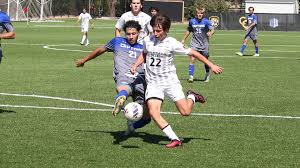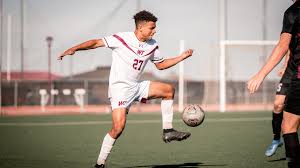May 25, 2024
•
Templates
How to Create a College Soccer Recruiting Email That Coaches Will Read

The latest on everything
College Soccer

Get our 5-minute, daily newsletter on what matters in college soccer.
How-To: College Soccer Recruiting Email
One of the most important steps in the college soccer recruiting process is reaching out to college coaches and expressing your interest in their programs.
But with so many players vying for spots on college teams, how can you make sure your email stands out and gets noticed by busy coaches?
In this article, I'll walk you through the key components of a compelling college soccer recruiting email template that will help you catch the eye of coaches and increase your chances of getting a response. By crafting a well-structured, personalized, and informative email, you can showcase your talents, demonstrate your character, and take a proactive approach to your college soccer dreams.
Unfortunately, many high school players struggle to write effective recruiting emails for a variety of reasons:
Lack of guidance
Without a clear template or understanding of what coaches are looking for, players often send generic or incomplete emails that fail to make an impact.
Failing to personalize
Coaches can spot a copy-and-paste email from a mile away. Players who don't take the time to research programs and address coaches by name may come across as disinterested or lazy.
Not providing enough information
Players who don't include key details about their academic and athletic achievements, or who forget to attach a highlight video or soccer resume, make it harder for coaches to evaluate their potential fit for the program.
Poor writing skills
Emails with spelling and grammar errors, or those that are too lengthy or lack clarity, can be a turn-off for coaches and may not effectively communicate the player's qualities and goals.
But don't worry - by following a step-by-step approach and including the right elements in your email, you can overcome these common pitfalls and make a strong impression on college coaches. Here's how:
Step 1: Start with a strong subject line
Your email's subject line is the first thing a coach will see, so it's crucial to make it count. Keep it concise and attention-grabbing, while also including key information like your graduation year, position, and any notable accomplishments.
For example: "2024 All-State Forward Interested in Your Program" or "2025 Goalkeeper with 12 Shutouts Seeks Info on Your Team"
Step 2: Address the coach by name and personalize your message
Take the time to research the program and the coach you're contacting. Address them by name (e.g., "Dear Coach Johnson,") and mention something specific about their team that resonates with you, such as a recent win or a style of play that aligns with your strengths.
Many players make the mistake of sending the same generic email to multiple coaches, which can come across as impersonal and lazy. By tailoring your message to each program, you demonstrate your genuine interest and commitment to finding the right fit.
Step 3: Provide key information about your academic and athletic background
In the body of your email, introduce yourself and provide a brief overview of your academic and athletic achievements. Include your GPA, test scores (if available), and any honors or awards you've received in the classroom.
Next, highlight your soccer experience, including your current team, position, stats, and any notable accomplishments (e.g., all-conference selections, tournament wins, etc.). Be specific and concise, focusing on the details that best showcase your skills and potential.
Many players forget to attach a highlight video or soccer resume to their email, which can make it harder for coaches to evaluate their fit for the program. Be sure to include a link to your highlight reel (preferably hosted on YouTube or a similar platform) and attach a PDF of your soccer resume, which should include more detailed information about your athletic and academic background.
As a former college soccer player and current coach, I know firsthand the impact a well-crafted recruiting email can have. By putting these tips into action and staying proactive in your outreach, you'll increase your chances of finding the right college soccer fit and making your dreams of playing at the next level a reality.
Related
#1 College Soccer Newsletter
Join thousands of current readers and get our 5-minute, daily newsletter on what matters in college soccer.





